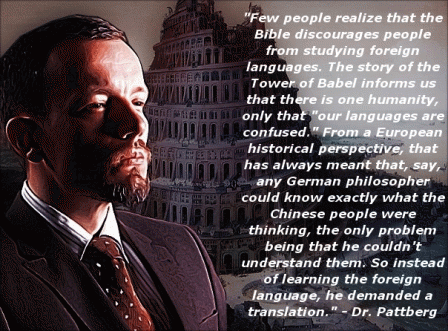| Back OpEd News | |||||||
|
Original Content at https://www.opednews.com/articles/The-End-of-Translation-and-by-Thorsten-Pattberg-120925-821.html (Note: You can view every article as one long page if you sign up as an Advocate Member, or higher). |
|||||||
September 26, 2012
The End of Translation and the Rise of Chinese Terminology
By Thorsten Pattberg
Dr. Pattberg, German linguist and cultural critic, talks about the problems of translation, the future of global language and the rise of Chinese vocabularies.
::::::::
The End of Translation and the Rise of Chinese Terminology BEIJING - Few people realize that the Bible discourages people from studying foreign languages. The story of the
Coincidentally, or maybe not quite so, 'History' with a capital 'H' followed the Bible. At the time of the Holy Roman Empire of German Nation, when German scholars still spoke Latin, the German logician Christian Wolff got his hands on a Latin translation of the Confucian Classics. His reaction, I think, is as funny as it is disturbing: He reads Kongzi in Latin and says something like "Great, that looks very familiar, I have the feeling that I totally understand this Confucius!".
Wolff was so overjoyous with his new mental powers, that he went on to lecture about the Chinese as if he was the king of
And, of course, when somebody occasionally asked master Wolff why he didn't visit
It's thus pretty much established, I think, that History stopped with this Wolff , or at least got too tired and too cynical. He sufficiently demonstrated that just about any European could become a '
Since this was true for just about any foreign language; so now we know why the German philosopher Immanuel Kant could reasonably announce 'The End of All Things', and Georg Hegel could proclaim 'The End of History'. Both learned men knew very well that they hadn't mastered any non-European language in their life-time; and they simply assumed that History was a bit like that too.
This attitude in the Western hemisphere has never changed, with the effect that we live in a crazy world today. Most American and European scholars believe that the Chinese "speak their (Western) languages", only that they "talk" in Chinese. Take the case of 'democracy' and 'human rights'. You may have considered this, but those are European words and do not exist in
The European attitude is reflected in its translations. Most Westerners simply translate every Chinese key concept into convenient biblical or philosophical terminology. As a result, modern nation states, like
Translation, of course, is an old human habit. But that doesn't mean we shouldn't question it. It was our habit to slay our opponents in battle, but we don't do that any more (except in
It might sound very depressing, but truth must be told: the West knows little about
To put it another way: have you ever wondered why there are now "philosophers" and "saints" all over the world , but that there has never been a single shengren or buddha in the West? Think about it, what is that probability? Whose version of 'History' are we taught? The East has been preyed upon and is bleeding out of its socio-cultural originality as we speak.
I often feel embarrassed for some Asian professors (who obviously received their "higher qualifications" in the west) when they open yet another department of "Chinese philosophy" or "Chinese religion" in
"Philosophy" is a Greco-Hellenic concept that is syndicated by the Judeo-Christian tradition. Rujiao, Fojiao, and Daojiao are all jiao, teachings. As to "religion" there is only one, the Western conception : We all live in the year 2012 of the Lord Jesus Christ. The so-called "freedom of religion" has to be understood as: "in this Christian world, you may believe whatever you want".
Some commentators have argued with me that we need a 'Global language', and today's English is the best candidate. To this I reply, are you crazy, that's exactly what the Germans once did; now it's the Anglo-Saxons who close their 'History' books and say "we already know you". No, the true 'Global language' would be radically different from today's English, it would need to adopt the originality and the tens of thousands of words provided by humankind's other language traditions on top of it.
Every language learner has this from time to time: a subconscious certainty that something is lost in translation, every time, without exception. Yet, most of us are too fearful to follow our gut-feeling through.
Maybe there is a hidden flaw in the story of the
It is often said that language is the key to understanding
The question is, which one should it be.
Versions of this article appeared in Shanghai Daily and Global Times in Sept. 2012.
Authors Bio:
Dr. Thorsten J. Pattberg (è£´å¾·æ€ Pei Desi) is a German philosopher and cultural critic.
